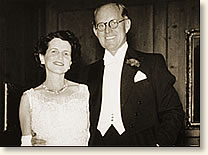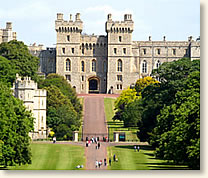|
Dining with the King and Queen
of England, 1938
In early 1938 President Roosevelt appointed Joseph Kennedy as America's Ambassador to Great Britain. Kennedy's grandparents had emigrated to the United States in the 1840s to escape Ireland's Great Famine and settled in Boston. Joe was born in Boston in 1888, graduated from Harvard College in 1912 and became active in Boston's Democratic Party. In 1914 he married Rose Fitzgerald, the daughter of Boston's mayor.
 |
| Joe and Rose Kennedy, 1938 |
During the 1920s, Kennedy began to amass a personal fortune through dealings
in the stock market, real estate, Hollywood film production and the importation
of liquor from Britain. By 1932, he was a major contributor and fund-raiser
for Franklin Roosevelt's presidential bid. Following his election, the new
president awarded Kennedy the chairmanship of the newly created US Securities
and Exchange Commission. The president's later appointment of Kennedy as the
country's
Ambassador to Great Britain made him the first Irish Catholic to fill that
position.
The Ambassador's appointment came at a critical time. The war clouds that
would soon envelop Europe were beginning to form over the continent. German
troops had re-occupied the Rhineland district without opposition in 1936. Hitler
was now poised to absorb Austria and Czechoslovakia's Germanized Sudetenland
into the Third Reich.
The new ambassador, his wife Rose and seven of their nine children (including John, future president of the United States) arrived in England in March, 1938. The Ambassador and his wife were invited by the King and Queen to spend the weekend of April 9-11 with them at Windsor Castle outside London.
The diary of Rose Kennedy reveals the excitement she and her husband experienced during their first introduction to the King and Queen of England:
"We came up from London in an embassy car from Windsor
and drove through a large and beautiful park to arrive at the castle at 7:00
PM. There we were met by the Master of the Household, Brig. General Sir Will
Child, who conducted us to our rooms. They were in one of the towers with
a lovely view of the park, and were upholstered in red damask and white linen
paper: there were accessories in gold and white. In my bedroom was a huge
bed, also upholstered in red damask and set high, so one had to use a step
stool to enter it. There were numerous servants in evidence, in full livery;
soon one of them brought us sherry. Another, who as well as livery wore a
peruk [wig], was especially appointed to attend
us and led the way whenever we left the suite.
After a few minutes of contemplating the scene, Joe turned to me and said, 'Rose, this is a hell of a long way from East Boston!'
That weekend at Windsor was one of the most fabulous, fascinating experiences
of my life. I took many diary notes. These are excerpts which I hope will be
interesting to others: At 8:20 the footman came to escort us to the green reception.
At 8:30 the King and Queen came in and greeted everybody by shaking hands.
All the ladies curtsied. Dinner was announced and the King and Queen walked
ahead. . .
They sat opposite each other at the middle of the table, I at the King's right and Mrs. Chamberlain on his left. The Ambassador sat on the Queen's right and the Prime Minister on her left. Lord Elphinstone [the Queen's brother-in-law] was on my right and was extremely agreeable. I talked a good deal to the King about my children. On the wall behind the Queen was a portrait of Queen Victoria with the ribbon of the of the Order of the Garter. Conversation led to this and to the story that Queen Victoria had declared that the ribbon was not painted the correct hue and had sent to the artist so he could do retouching. He somehow thought he was being decorated with the order and when after correspondence and dispute, he learned this was not the case he refused the royal wish – so the color was never made right.
 |
| Windsor Castle |
Table decorations consisted of high flowers, which made it difficult for the King and Queen to see each other and caused some good-natured teasing when he could not communicate to her that she should rise, the signal to leave the table.
After dinner the Queen stood in front of the fireplace in one of the drawing rooms. Each of the men bowed to her, then went into an adjoining room to talk with the King, the ladies remaining with the Queen. She talked with me first for about 15 minutes, Then Lady Halifax brought up each of the other ladies in turn. Joe told me that the same procedure took place with the men, in regard to the King. Meanwhile, a Scottish piper walked through the rooms, piping away. The Queen is of Scottish descent. We are of Irish. The pipers are equally Scottish and Irish; so this is a congenial touch.
I found it very difficult to accustom myself to saying 'Ma'am'
when addressing the Queen and she told me not to bother; putting me at my ease.
She has a very pleasant voice, a beautiful complexion, great dignity and charm;
is simple in manner, stands very erect and holds herself well and is every
inch a Queen. We talked, among other things, about the difficulty of sleeping
in London, and the Queen was very much amused that I put wax in my ears.
After awhile the King and the men came back, and after mixed conversation, the King and Queen showed us some of the treasures of the castle, in a room off the drawing rooms. There were jewelry and trinkets worn by Mary Queen of Scots and the original blue garter from which the Order of the Garter got its name.
At 11:00 the Queen said good-night and shook hands again with all. In bed, but before sleep we heard the sounds of the changing of the guard, and the clock striking in the tower'"
References:
Rose Kennedy's diary is a part of the collection of the National Archives, John F. Kennedy Library and Museum, Boston, MA; Schwartz, Ted, Joseph P. Kennedy (2003).
How To Cite This Article:
"Dining with the King and Queen of England, 1938" EyeWitness to History, www.eyewitnesstohistory.com (2008).
|






